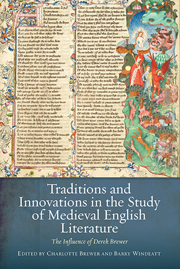 Traditions and Innovations in the Study of Medieval English Literature
Traditions and Innovations in the Study of Medieval English Literature Book contents
- Frontmatter
- Contents
- List of Contributors
- Acknowledgements
- Note on References
- Introduction: A Modern Medievalist's Career
- 1 Derek Brewer: Chaucerian Studies 1953–78
- 2 Brewer's Chaucer and the Knightly Virtues
- 3 Class Distinction and the French of England
- 4 Time in Troilus and Criseyde
- 5 Virtue, Intention and the Mind's Eye in Troilus and Criseyde
- 6 Falling in Love in the Middle Ages
- 7 The Idea of Feminine Beauty in Troilus and Criseyde, or Criseyde's Eyebrow
- 8 ‘Greater Love Hath No Man’: Friendship in Medieval English Romance
- 9 Gowerian Laughter
- 10 Derek Brewer's Romance
- 11 Malory and Late Medieval Arthurian Cycles
- 12 The Ends of Storytelling
- 13 Manuscripts, Facsimiles, Approaches to Editing
- 14 Words and Dictionaries: OED, MED and Chaucer
- 15 Afterlives: The Fabulous History of Venus
- Afterword: Derek Brewer: with ful deuout corage
- Bibliography
- Index
- Tabula in Memoriam
12 - The Ends of Storytelling
Published online by Cambridge University Press: 05 September 2013
- Frontmatter
- Contents
- List of Contributors
- Acknowledgements
- Note on References
- Introduction: A Modern Medievalist's Career
- 1 Derek Brewer: Chaucerian Studies 1953–78
- 2 Brewer's Chaucer and the Knightly Virtues
- 3 Class Distinction and the French of England
- 4 Time in Troilus and Criseyde
- 5 Virtue, Intention and the Mind's Eye in Troilus and Criseyde
- 6 Falling in Love in the Middle Ages
- 7 The Idea of Feminine Beauty in Troilus and Criseyde, or Criseyde's Eyebrow
- 8 ‘Greater Love Hath No Man’: Friendship in Medieval English Romance
- 9 Gowerian Laughter
- 10 Derek Brewer's Romance
- 11 Malory and Late Medieval Arthurian Cycles
- 12 The Ends of Storytelling
- 13 Manuscripts, Facsimiles, Approaches to Editing
- 14 Words and Dictionaries: OED, MED and Chaucer
- 15 Afterlives: The Fabulous History of Venus
- Afterword: Derek Brewer: with ful deuout corage
- Bibliography
- Index
- Tabula in Memoriam
Summary
Storytelling may be one of the very oldest human activities after the acquisition of language. Language is a symbolic process that produces signifying sounds as a substitute for the things themselves; story allows those sounds to be linked to describe a sequence of events that are not present as fact but that have their existence in the mind, as memory or conjecture or imagination. The very earliest cave paintings or rock art suggest pre-existing stories of some kind behind them. Studies of memory formation and of childhood psychology suggest that it is the ability to form narratives, to shape random events into the syntax of a story, that enables an infant to make sense of the world it finds itself in.
Derek Brewer was increasingly fascinated by story and storytelling – not just in particular stories, though his delight in those masters of narrative Chaucer and Malory makes that evident, but in the principles underlying story itself. That is apparent even in the titles of some of his publications, in his Symbolic Stories: Traditional Narratives of the Family Drama in English Literature (1980), or in the collection of articles he entitled Chaucer: The Poet as Storyteller (1984b). That contains a reprint of his earlier Gollancz lecture, delivered in 1974, ‘Towards a Chaucerian Poetic’, which is perhaps his most concise and detailed consideration of the principles underlying story as such, and of the importance of story – especially traditional forms of narrative, folk-tales, fairy-tales and many medieval romances – over whatever meanings might be attached to them.
- Type
- Chapter
- Information
- Traditions and Innovations in the Study of Medieval English LiteratureThe Influence of Derek Brewer, pp. 188 - 201Publisher: Boydell & BrewerPrint publication year: 2013


